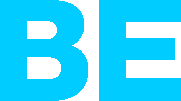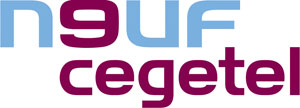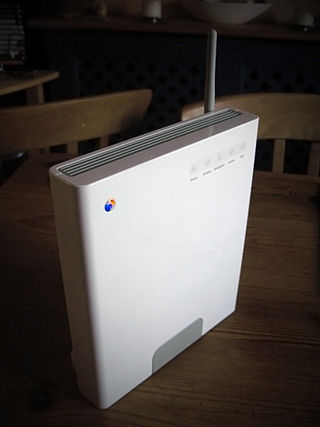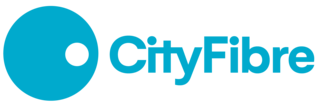BT Group plc is a British multinational telecommunications holding company headquartered in London, England. It has operations in around 180 countries and is the largest provider of fixed-line, broadband and mobile services in the UK, and also provides subscription television and IT services.
Freeserve was a British Internet service provider, which was founded in 1998. At its height, the company became a constituent of the FTSE 100 Index, before merging into the Wanadoo group in 2001. It then became a subsidiary of France Telecom, who owned a controlling interest in Wanadoo. Wanadoo rebranded over time and eventually became Orange Home UK.
Telkom SA SOC Limited is a South African wireline and wireless telecommunications provider, operating in more than 38 countries across the African continent. Telkom is majority state-owned (55.3%) with the South African government owning 40.5% of Telkom, while another 14.8% is owned by another state-owned company - the Public Investment Corporation (PIC), which is closely linked to the South African government.
KCOM Group is a UK communications and IT services provider. Its headquarters are in the city of Kingston upon Hull, and it serves local residents and businesses with Internet and telephony services. It was listed on the London Stock Exchange but is now privately owned by Macquarie Group.
A naked DSL, also known as standalone or dry loop DSL, is a digital subscriber line (DSL) without a PSTN service — or the associated dial tone. In other words, only a standalone DSL Internet service is provided on the local loop.

Plusnet plc is a British triple play internet service provider (ISP) providing broadband, landline and mobile services. The company was founded in 1997 in Sheffield, England, and became a public limited company (plc) in July 2004 when it was floated on the Alternative Investment Market. On 30 January 2007, Plusnet was acquired by BT Group, but it continues to operate as a separate business. By December 2013, it had over 750,000 customers across the UK.

Be Unlimited was an Internet service provider in the United Kingdom between 2004 and 2014. Initially founded as an independent company by Boris Ivanovic and Dana Tobak in 2005, it was bought by Spanish group Telefónica Europe in 2006 before being sold on to BSkyB in March 2013 in an agreement which saw BSkyB buy the fixed telephone line and broadband business of Telefónica Europe which at the time traded under the O2 and BE brands. The deal saw BSkyB agree to pay £180 million initially, followed by a further £20 million after all customers had been transferred to Sky's existing business. The sale was subject to regulatory approval in April 2013, and was subsequently approved by the Office of Fair Trading on 16 May 2013.
Openreach Limited is a company wholly owned by BT Group plc, that maintain telephone cables, ducts, cabinets and exchanges that connect nearly all homes and businesses in the United Kingdom to various national broadband and telephone networks. They were established in 2006 following an agreement between BT and the UK's telecoms regulator, Ofcom, to implement certain undertakings, pursuant to the Enterprise Act 2002, to ensure that rival telecom operators have equality of access to BT's local network.

Eclipse Broadband, previously known as Eclipse Internet and Eclipse, is a UK provider of business technology services previously based in Exeter, Devon and Hull, East Yorkshire where it was owned by KCOM Group PLC. Eclipse supplies connectivity, cloud and communication services to support businesses. Its three product portfolios include ADSL, fibre and leased line broadband services; wide area networks as a managed service; backup, Lync, Hosted Exchange and data hosting services; and communication services, including both fixed line and IP-based voice. Eclipse Broadband is now a part of the Global 4 Group.
Metallic path facility (MPF) are the unshielded twisted pair of copper wires that run from a main distribution frame (MDF) at a local telephone exchange to the customer. In this variant, both broadband and voice (baseband) services, together potentially with a video on demand service, are provided to the end user by a single communications provider. MPF services are typically delivered through use of an MSAN.

Neuf Cegetel was a French wireline telecommunications service provider and a mobile virtual network operator (MVNO). It offered various telecommunications services to consumers, enterprises and wholesale customers, ranking second in the country in annual revenues. It was legally established in 2005 following the completion of the merger between Neuf Telecom and Cegetel. As of June 2008, the company became a wholly owned subsidiary of SFR, and the brand disappeared commercially.

The BT Smart Hub is a family of wireless residential gateway router modems distributed by BT for use with their own products and services and those of wholesale resellers but not with other Internet services. Since v 5 Home/Smart Hubs support the faster Wi-Fi 802.11ac standard, in addition to the 802.11b/g/n standards. All models of the Home Hub prior to Home Hub 3 support VoIP Internet telephony via BT's Broadband Talk service, and are compatible with DECT telephone handsets. Since the Home Hub 4, all models have been dual band.

The United Kingdom has been involved with the Internet throughout its origins and development. The telecommunications infrastructure in the United Kingdom provides Internet access to homes and businesses mainly through fibre, cable, mobile and fixed wireless networks, with the UK's 140-year-old copper network, maintained by Openreach, set to be withdrawn by December 2025, although this has since been extended to 31st January 2027 in some areas due to reasons including panic alarms in sheltered housing needing a persistent connection which can't be guaranteed with internet-based DECT systems.

BT Consumer is the main retail division of United Kingdom telecommunications company BT Group that provides fixed-line, mobile, broadband and digital television to consumers in the UK. It buys access to some of these services from BT's other divisions: Openreach and EE. It is the largest consumer fixed-line and broadband ISP in the UK.
BT Superfast Fibre is a broadband service in the United Kingdom provided by BT Consumer, the consumer sales arm of the BT Group. The underlying network is fibre-to-the-cabinet (FTTC), which uses optical fibre for all except the final few hundred metres (yards) to the consumer, and delivers claimed download speeds of "up to 76 Mbit/s" and upload speeds of "up to 19 Mbit/s" depending on package selected. The fibre terminates in a new roadside cabinet containing a DSLAM, from where the final connection to the customer uses VDSL2 technology.
Andrews & Arnold Ltd is an Internet service provider based in Bracknell, England. Launched in 1998, the company serves businesses and home users.
BT Redcare is the largest supplier of alarm signalling services for security and fire in the UK. It was established over thirty years ago, and works with both the business and domestic markets.

BT Business and Public Sector was a division of United Kingdom telecommunications company BT Group that provided fixed-line, mobile, broadband and IT services to businesses and the public sector in the UK and Ireland. It bought many of its services from BT's other divisions: EE, BT Global Services, BT Wholesale and Openreach. It also sold other vendors' products and services such as the Avaya IP Office business telephone system.

BT Business is a division of British telecommunications company BT Group that provides products and services to organisations in the small-to-medium-sized business, corporate and public sectors, and wholesale services through BT Wholesale. These offerings include fixed and IP voice, unified communications, mobile telephony, cyber security, cloud computing and managed services.

CityFibre is an independent British telecommunications network provider, providing gigabit-capable FTTP broadband across the UK. They are the third-largest network provider in the UK, after Openreach and Virgin Media. It is considered one of the UK's "altnets", in reference to being an alternative to Openreach.









